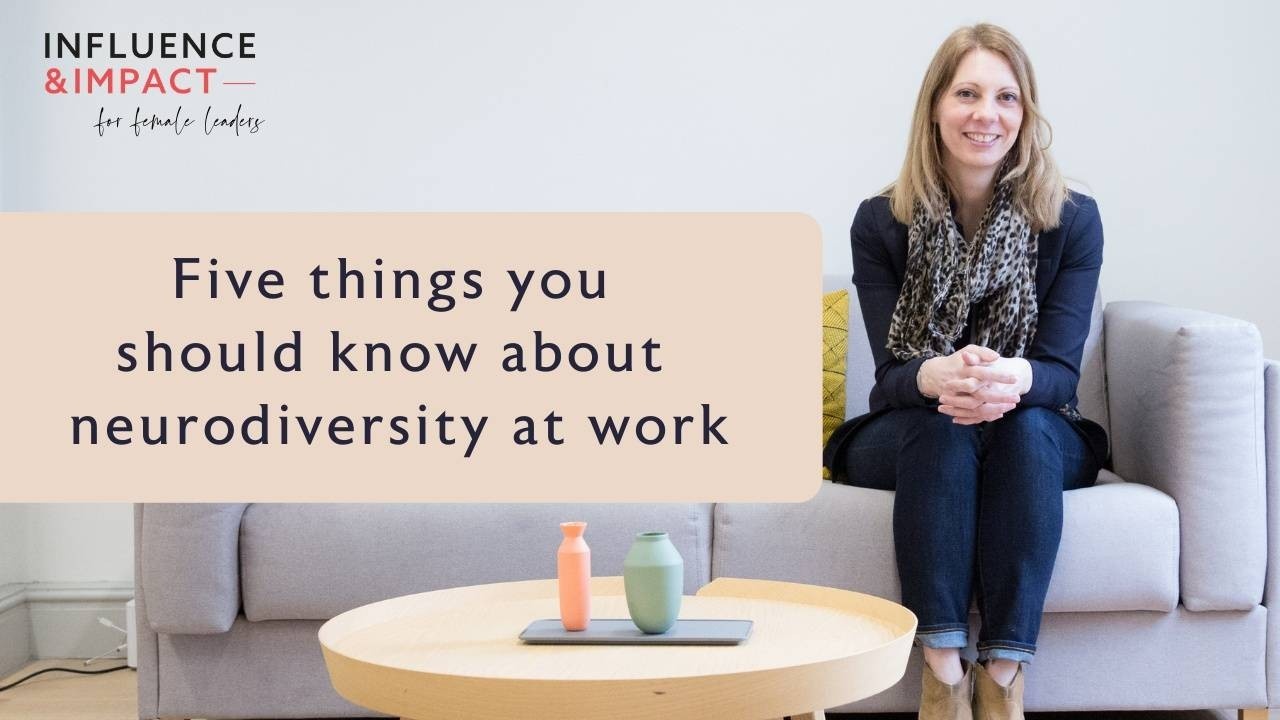Five Things You Should Know About Neurodiversity at Work

In a recent episode of the Influence & Impact Podcast for Female Leaders, I interviewed Professor Amanda Kirby, an expert in neurodiversity, the CEO of Do-It Solutions and co-author of the new book,
It was such an interesting discussion I want to share some of the key points I picked up during the interview and you can listen to the full episode here.
Have you heard of neurodiversity? It’s an emerging subject especially in relation to adults and the workplace.
We are all neurodiverse individuals and neurodiversity simply defines the different ways we think, act and communicate.
About 10% of us are neurodivergent, which means the way we do these things is different from the “average” or “norm”. This influences our individual strengths and challenges, in both our personal and work lives. Some examples of this are people who have been diagnosed with autism, ADHD or dyslexia but many people have no diagnosis and just know that their brain seems to be wired differently from others.
Unfortunately, being neurodivergent is often negatively stereotyped and not well understood by managers or leaders. A recent CIPD study showed that 72 percent of HR professionals said that consideration of neurodiversity wasn’t included in their people management practices
Amanda shared valuable insights about the challenges that neurodivergent employees experience in the workplace and lots of practical tips for how leaders and organisations can support them.
Here’s five ways that you can support neurodivergent team members in your workplace and create an environment that embraces neurodiversity:
1. Learn about it
Take the time to understand neurodiversity and perhaps some of the assumptions you have made about what good performance looks like. A great place to start is the book Amanda co-authored with Theo Smith - Neurodiversity at Work: Drive Innovation, Performance and Productivity with a Neurodiverse Workforce.
2. Create a safe environment
Once you understand it, make neurodiversity an open conversation and embrace it as a strength in your team. Celebrate what every individual uniquely brings.
3. Be proactive with your support
Speak to neurodivergent team members and ask them how you can support them, what their strengths are and what they find most challenging. Then find new ways of working. I worked with an incredible fundraiser who was dyslexic. She worked to her strengths of inspiring people and connecting and storytelling and wove her magic and any formal proposals were spellchecked before they went out because she asked for that support.
4. Assess your recruitment practices
It’s important to create an inclusive recruitment process that acknowledges and encourages neurodivergent applicants. Some simple things you can implement are being really open about the format and flow of the interviews and interview process and providing questions in advance. But also check that some of the assumptions you may make about CVs based on spelling or grammar are not ruling out some talented people.
5. Your work environment matters
Assess your work environment for accessibility and inclusivity. You can get ideas and inspiration from universal design principles but start with finding out how the people in your team work best. Do they need quiet for example or do they struggle to sit still for a 2 hour meeting?
If you’d like to understand neurodiversity in detail, hear more of Amanda’s insights and learn how to implement these tips, you can access the full episode here: https://www.carlamillertraining.com/podcast
I’d love to hear your experiences or your thoughts on the episode in the comments.
Listen to the Influence & Impact podcast on Carla’s website, Apple, Spotify or Stitcher
For more articles on the issues that impact women leaders at work follow Carla Miller on LinkedIn
Find out about the various ways Carla works with women leaders and organisations on her website www.carlamillertraining.com

